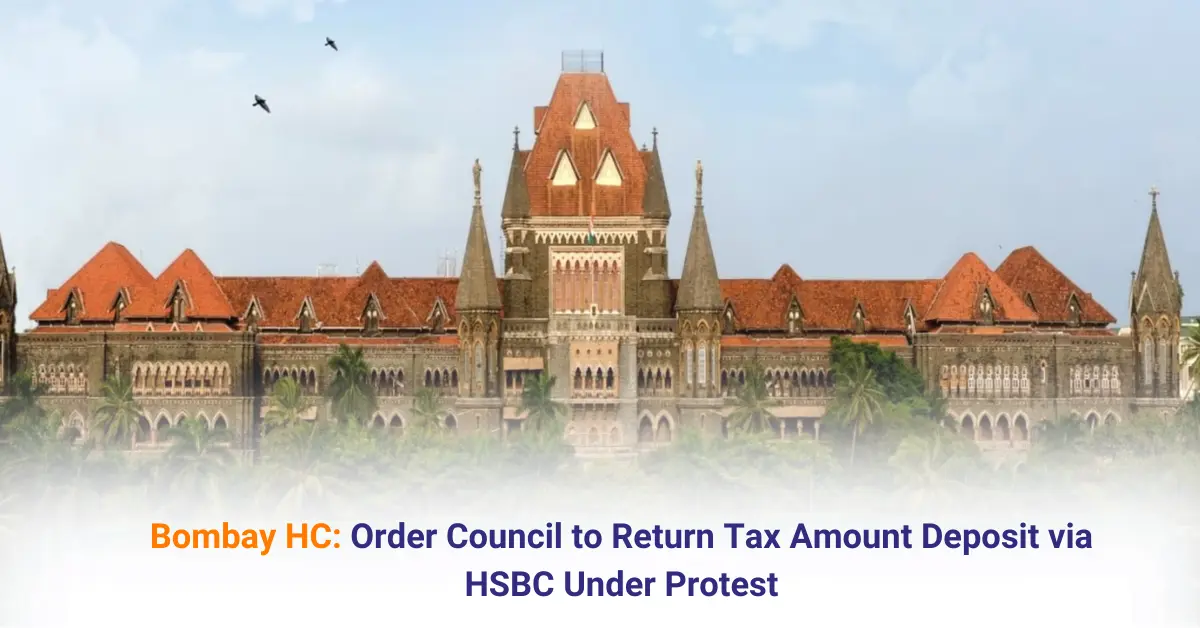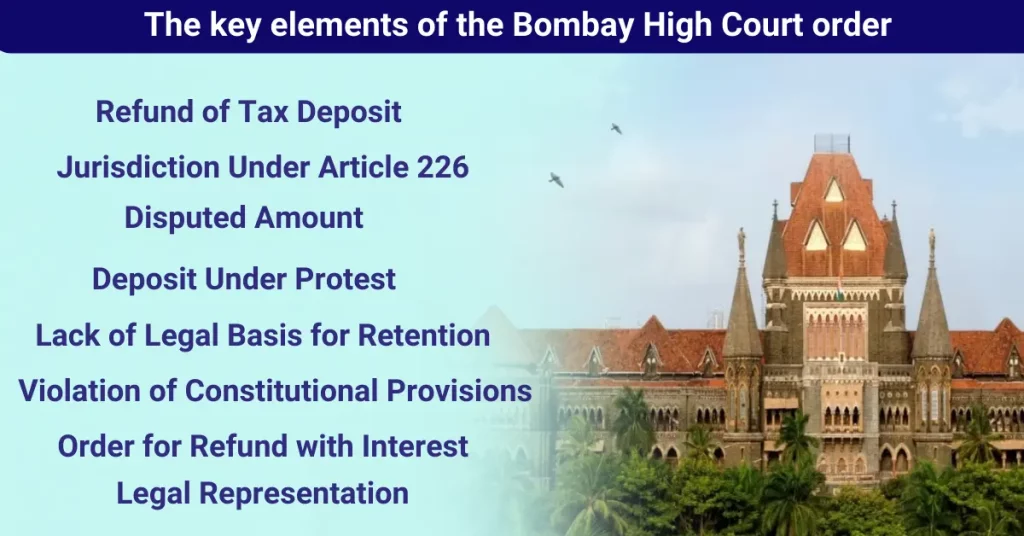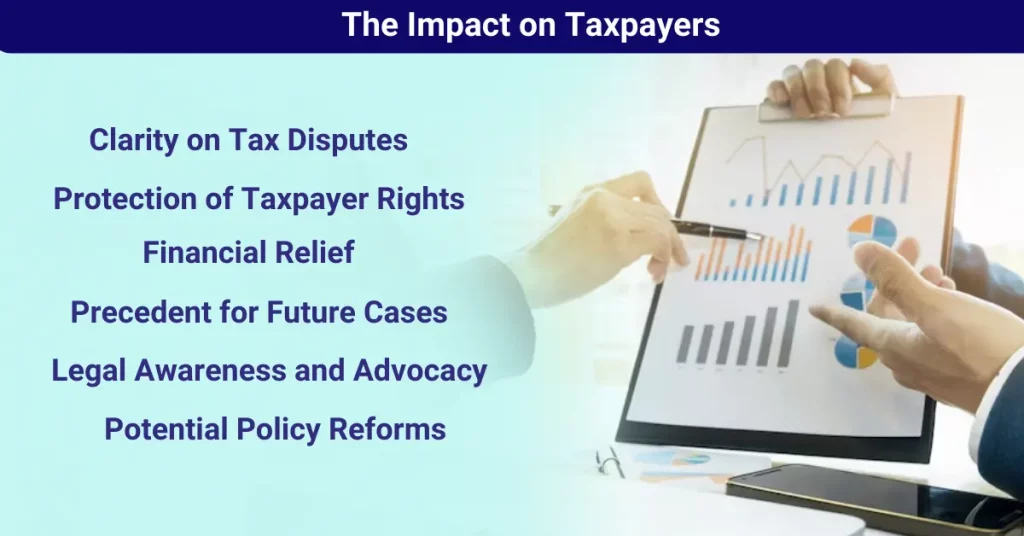The Bombay High Court recently made a decision ordering the council to return a significant sum of tax money that was deposited via HSBC (Hongkong and Shanghai Banking Corporation) during a protest. HSBC has deposited 56.19 crore. Justices G. S. Kulkarni and Jitendra Jain emphasized that the council had unlawfully retained these funds, which the applicant argued were deposited to settle potential service tax demands and interest. The court found that the council had no legal basis to withhold the money and ruled in favor of the applicant, directing the refund of the disputed amount along with interest.
Understanding the Background

The case at the Bombay High Court involved a dispute between The Hongkong and Shanghai Banking Corporation (HSBC) and the Union of India regarding tax payments. HSBC had deposited a large sum of money under protest, meaning they disagreed with the tax demand but still paid it to avoid further conflict. However, the tax department retained this money without legal authority, prompting HSBC to seek a refund through a legal writ under Article 226 of the Indian Constitution.
HSBC argued that the amount in question, totaling Rs. 56,19,84,075, was not legally owed as no tax liability existed. They claimed the deposit was made to settle potential tax demands and interest on certain transactions. Despite this, no formal notice or explanation was provided by the tax department regarding the specific tax obligations.
HSBC contended that the tax department’s retention of the funds was unlawful since they were paid under protest. According to them, once money is deposited under protest, the department has no right to withhold it without proper legal basis, as this would violate constitutional provisions. Furthermore, HSBC highlighted that the department had enjoyed the deposited funds for over a decade without taking any legal steps to justify its claim.
The Bombay High Court, after considering the arguments presented by both parties, ruled in favor of HSBC. Justices G. S. Kulkarni and Jitendra Jain declared that the tax department had unlawfully retained the funds and ordered their refund to HSBC, along with interest. The court’s decision was based on the principle of upholding legal authority and fairness in tax matters.
Key Elements of the Bombay HC Order

The key elements of the Bombay High Court order:
- Refund of Tax Deposit: The primary element of the order is the direction from the court to refund the tax money deposited by The Hongkong and Shanghai Banking Corporation (HSBC) under protest.
- Jurisdiction Under Article 226: The court emphasized the petitioner’s right to invoke Article 226 of the Indian Constitution to seek a writ for the refund of unlawfully retained or withheld money.
- Disputed Amount: The case revolved around a significant sum of Rs. 56,19,84,075, which the petitioner argued had been taken without legal authority, and asserted that no tax was owed.
- Deposit Under Protest: The petitioner claimed to have made the deposit with the department under protest, indicating disagreement with the legality of the action.
- Lack of Legal Basis for Retention: The court found that the department had no legal authority to retain the deposited funds, especially considering they were made under protest.
- Violation of Constitutional Provisions: The petitioner argued that the department’s retention of the funds violated Article 265 of the Indian Constitution, which pertains to taxation without authority of law.
- Lapse of Time: Despite 11 years passing since the deposit, the department had not taken any legal steps to appropriate the money.
- Order for Refund with Interest: In light of these findings, the court ordered the department to refund the disputed amount to the petitioner, along with interest.
- Legal Representation: The case involved legal representation from Advocate Abhishek A. Rastogi for the petitioner and Advocate Deepak Sharma for the respondent.
These elements collectively outline the circumstances, arguments, and ruling of the Bombay High Court in this particular case.
The Impact on Taxpayers

The impact on taxpayers are:
- Clarity on Tax Disputes: The court’s ruling clarifies the rights of taxpayers in cases where they deposit tax amounts under protest. It sets a precedent that taxpayers have the right to challenge the legality of tax demands and deposits.
- Protection of Taxpayer Rights: The decision underscores the importance of protecting taxpayer rights against arbitrary actions by tax authorities. It emphasizes that tax authorities must act within the bounds of the law and cannot retain funds without legal authority.
- Financial Relief: For taxpayers who have made deposits under protest, the ruling provides a pathway for potential financial relief. It opens the possibility of refunding unlawfully retained funds, which could alleviate financial burdens on affected taxpayers.
- Precedent for Future Cases: The court’s decision establishes a legal precedent that can guide future cases involving similar circumstances. It sets clear expectations for tax authorities regarding the handling of tax deposits made under protest.
- Legal Awareness and Advocacy: The case highlights the importance of legal awareness and advocacy for taxpayers. It underscores the value of seeking legal representation and invoking constitutional provisions to protect taxpayer rights and interests.
- Potential Policy Reforms: The ruling may prompt policymakers to review tax laws and procedures to ensure greater transparency, accountability, and fairness in tax administration. It could lead to reforms aimed at preventing unlawful retention of taxpayer funds in the future.
Overall, the impact on taxpayers is one of empowerment, protection, and potential financial relief, as well as the promotion of fair and accountable tax administration practices.
Navigating the Legal Landscape
The case sheds light on the complex legal landscape that taxpayers often navigate when dealing with tax disputes. It underscores the importance of understanding and asserting one’s legal rights in such matters.
In this scenario, the applicant (taxpayer) challenged the actions of the GST council, asserting that the tax deposited via HSBC was not legally owed. The applicant invoked Article 226 of the Indian Constitution, seeking a writ for the refund of the deposited amount, which was allegedly retained unlawfully by the council.
The court’s ruling reflects the critical role of legal interpretation and advocacy in resolving tax disputes. It highlights the significance of legal arguments, such as whether funds were deposited under protest and whether the council’s actions violated constitutional provisions.
For taxpayers, navigating the legal landscape involves not only understanding tax laws but also leveraging legal mechanisms to protect their rights and interests. It underscores the need for legal awareness and expertise to effectively challenge tax assessments and seek redress for wrongful actions by tax authorities.
Council’s Response and Compliance
Following the court’s ruling, the council would be legally obliged to comply with the order and refund the tax amount deposited by the applicant via HSBC during the protest. Compliance would involve returning the disputed funds along with any applicable interest, as directed by the court.
HSBC’s Role in the Process
Based on the understanding of the above paragraph, HSBC’s role in the process appears to be that of a depositor of tax funds under protest. Specifically:
- Deposit of Tax Funds: HSBC, as a taxpayer, deposited a significant sum of tax money with the department under protest. This suggests that HSBC made the deposit while contesting the legality or validity of the tax demand or assessment.
- Challenging Tax Authority Actions: HSBC contested actions taken by the tax department or respondents regarding the deposited amount. This indicates that HSBC questioned the legality or authority of the department’s actions in retaining the deposited funds.
- Initiating Legal Proceedings: HSBC invoked legal mechanisms, such as Article 226 of the Indian Constitution, to seek redress for the retention of the deposited funds. This suggests that HSBC pursued legal recourse to challenge the department’s actions and seek a refund of the unlawfully retained funds.
Overall, HSBC’s role in the process appears to be that of a taxpayer asserting its rights, contesting the actions of the tax authorities, and seeking legal remedies to address the retention of tax funds deposited under protest.
Steps for Taxpayers to Retrieve Deposits
The steps for taxpayers to retrieve deposits depend on the type of deposit and the circumstances involved. However, here are some general steps:
- Review Documentation: Taxpayers should gather any relevant documents related to the deposit, such as receipts, transaction records, or communication with the deposit holder.
- Contact Deposit Holder: Reach out to the institution or individual holding the deposit, such as a bank, financial institution, or landlord, to inquire about the process for retrieving the deposit.
- Follow Procedures: Follow the specific procedures outlined by the deposit holder for retrieving the deposit. This may involve filling out forms, providing identification, or submitting a formal request.
- Resolve Disputes: If there are any disputes regarding the deposit, attempt to resolve them through communication with the deposit holder. If necessary, seek legal advice or mediation to address the issue.
- Document Communication: Keep a record of all communication with the deposit holder, including dates, times, and the content of conversations or emails.
- Escalate if Necessary: If attempts to retrieve the deposit are unsuccessful or if there are concerns about the legality of withholding the deposit, consider escalating the issue to relevant authorities or seeking legal recourse.
- Review Legal Rights: Familiarize yourself with your legal rights as a depositor, including any laws or regulations that govern the return of deposits in your jurisdiction.
- Seek Assistance: If you encounter difficulties or have questions about the process, consider seeking assistance from legal professionals, consumer protection agencies, or financial advisors.
Remember that the specific steps for retrieving deposits may vary depending on factors such as the type of deposit, the terms of the deposit agreement, and applicable laws and regulations. It’s important for taxpayers to understand their rights and responsibilities regarding deposits and to take appropriate action to retrieve their funds.
Conclusion
In conclusion, the Bombay High Court’s order in the case between The Hongkong and Shanghai Banking Corporation and the Union of India highlights the importance of protecting taxpayer rights. The ruling emphasizes that taxpayers have the right to challenge tax demands and deposits made under protest. It clarifies that tax authorities must act within the bounds of the law and cannot retain funds without legal authority. The decision provides potential financial relief for taxpayers and sets a precedent for future cases. It underscores the significance of legal awareness and advocacy in safeguarding taxpayer interests and promoting fair tax administration practices. Overall, the ruling empowers taxpayers and promotes accountability and transparency in tax-related matters.
Also Read: GST: Everything You Need To Know
FAQ’s
-
What was the recent decision made by the Bombay High Court regarding tax money deposited via HSBC during a protest?
The Bombay High Court ordered the council to return a significant sum of tax money deposited via HSBC, emphasizing that the council had unlawfully retained these funds.
-
What amount did HSBC deposit, and why did they do it?
HSBC deposited Rs. 56.19 crore under protest, disagreeing with the tax demand but paying it to avoid further conflict.
-
What legal mechanism did HSBC use to seek a refund?
HSBC invoked Article 226 of the Indian Constitution to seek a legal writ for the refund of the unlawfully retained money.
-
What argument did HSBC present regarding the tax department’s retention of the funds?
HSBC argued that once money is deposited under protest, the department has no right to withhold it without proper legal basis, as this would violate constitutional provisions.
-
What were the key elements of the Bombay High Court order regarding this case?
The key elements included the refund of tax deposit, jurisdiction under Article 226, the disputed amount, deposit under protest, lack of legal basis for retention, violation of constitutional provisions, lapse of time, order for refund with interest, and legal representation.
-
How did the court’s ruling impact taxpayers?
The ruling provided clarity on tax disputes, protected taxpayer rights, offered potential financial relief, set a precedent for future cases, highlighted the importance of legal awareness and advocacy, and hinted at potential policy reforms.
-
What steps should taxpayers take to retrieve deposits made under protest?
Taxpayers should review documentation, contact the deposit holder, follow procedures outlined by the holder, resolve disputes, document communication, escalate if necessary, review legal rights, and seek assistance if needed.
-
What role did HSBC play in the legal process?
HSBC acted as a taxpayer depositing funds under protest, challenging tax authority actions, and initiating legal proceedings to seek a refund of unlawfully retained funds.
-
How does the court’s ruling affect tax authorities?
The ruling emphasizes that tax authorities must act within the bounds of the law, cannot retain funds without legal authority, and sets expectations for fair and accountable tax administration practices.
-
What does the case reveal about navigating the legal landscape in tax disputes?
The case highlights the importance of understanding and asserting one’s legal rights, leveraging legal mechanisms for redress, and the critical role of legal interpretation and advocacy in resolving tax disputes.

